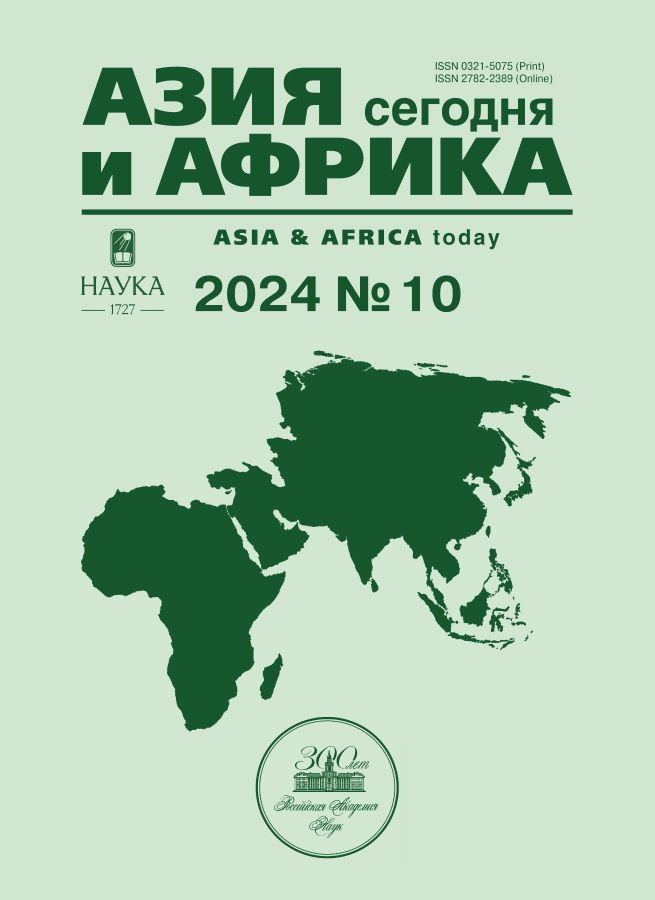Small Power in Big Politics: Singapore Foreign Policy During the Tenure of Lee Kuan Yew (1965-1990) and in Modern Times
- Autores: Garmash A.A.1
-
Afiliações:
- MGIMO
- Edição: Nº 10 (2024)
- Páginas: 33-38
- Seção: Politics, economics
- URL: https://kld-journal.fedlab.ru/0321-5075/article/view/647484
- DOI: https://doi.org/10.31857/S0321507524100045
- ID: 647484
Citar
Texto integral
Resumo
The author attempts to substantiate the hypothesis that Singapore, during the years of Lee Kuan Yew’s tenure as Prime Minister (1965-1990), pursued a pragmatic foreign policy course that was innovative for a small power. It was based on a hedging strategy in interaction with the United States, Singapore’s major partner, and maintaining equidistant relations with others important states in the region and around the globe. This politics also allowed Singapore to enter the XXI century with notable diplomatic achievements, the most important of which was an ability to maintain very close relations with both Washington and Beijing. As the geopolitical situation in the Asia-Pacific region becomes more complex, the Singaporean leadership, despite continuing attempts to preserve foreign policy balance between its main partners, appears to be gradually moving towards alignment with Washington contrary to the principles of multi-vector foreign policy laid down by its Founding Father. Thus, Singapore, which at one time set a trend towards greater independence in foreign policy in spite of physical limitations, in the current realities, on the contrary, prefers a more traditional behavioral model for a smaller power in dealing with bigger counterparts.
Palavras-chave
Sobre autores
Anna Garmash
MGIMO
Email: anna.a.garmash@gmail.com
ORCID ID: 0009-0004-1814-419X
Applicant, Department of Asian and African Studies, Third Secretary of the Department of Asia and Pacific Cooperation, Ministry of Foreign Affairs Moscow, Russian Federation
Bibliografia
- Колдунова Е.В. Дефицит лидерства в Восточной Азии: шансы для малых и средних держав. Международные процессы. 2011, № 2. С. 70-81.
- Ang Cheng Guan. 2011. The Global and the Regional in Lee Kuan Yew’s Strategic Thought: The Early Cold War Years. Singapore in Global History. Pp. 235-267.
- Lee Kuan Yew. 2000. From Third World to First: The Singapore Story, 1965-2000: Memoirs of Lee Kuan Yew. Singapore. P. 521.
- Rothstein Robert L. 1968. Alliances and Small Powers. New York and London: Columbia University Press. P. 26.
- Скриба А.С. Балансирование малых и средних государств. Международные процессы. 2014, № 4. C. 88-100.
- Астафьева Е.М. Сингапуро-американские отношения в контексте региональной безопасности в Южно-Китайском море. Юго-Восточная Азия: актуальные проблемы развития. 2016, № 32. C. 101-110.
- Han Fook Kwang. 2019. Post-Lee Kuan Yew World: Is His Strategic Vision Still Relevant? East Asia Forum. https://eastasiaforum.org/2019/04/10/is-lee-kuan-yews-strategic-vision-for-singapore-still-relevant/ (accessed 25.11.2023)
- Lee Kuan Yew. 2000. From Third World to First: The Singapore Story, 1965-2000: Memoirs of Lee Kuan Yew. Singapore. Pp. 635-691.
- Davenport T. Survival, success and the sea: the importance of Unclos to Singapore. The Straits Times, 15.09.2022. https://www.straitstimes.com/opinion/survival-success-and-the-sea-the-importance-of-unclos-to-singapore (accessed 05.12.2023)
- Ciorciari J., Haacke J. 2019. Hedging in International Relations: An Introduction. International Relations of the Asia Pacific. Vol. 19, № 3. Pp. 367-374.
- Mahbubani K. 2017. Qatar: big lessons from a small country. https://mahbubani.net/qatar-big-lessons-from-a-small-country-opinion-news-top-stories-the-straits-times/ (accessed 02.12.2023)
- Nur Asyiqin Mohamad Salleh, Chew Hui Min. 2017. Minister Shanmugam, diplomats Bilahari and Ong Keng Yong say Prof Mahbubani’s view on Singapore’s foreign policy ‘flowed’. https://www.straitstimes.com/singapore/prof-kishore-mahbubanis-view-on-singapores-foreign-policy-deeply-flawed-ambassador-at (accessed 10.03.2024)
- Tham D. 2023. Singapore to acquire 8 more F-35B fighter jets, growing fleet to 12. Channel News Asia. https://www.channelnewsasia.com/singapore/f35-fighter-jet-mindef-saf-rsaf-air-force-military-defence-3302941 (accessed 01.02.2024)
- Brands H. 2019. Singapore has some tough advice for the U.S. and China. https://www.bloomberg.com/view/articles/2019-10-02/singapore-has-some-tough-advice-for-the-u-s-and-china (accessed 20.03.2024)
- Li Xuanmin, Tu Lei. 2023. China, Singapore expected to expand depth, scope of BRI cooperation on PM Lee’s visit. The Global Times. https://www.globaltimes.cn/page/202303/1288300.shtml (accessed 05.02.2024)
- Kausikan B. 2005. Some fundamentals of Singapore’s foreign policy. The little red dot: reflections by Singapore’s diplomats. Singapore: World Scientific. Pp. 103-107.
- Trixie Sher Li Yap, Muyu Xu. 2023. Singapore companies should manage own risks in Russian oil trade, minister says. https://reuters.com/markets/commodities/singapore-companies-should-manage-own-risks-russian-oil-trade-minister-says-2023-02-24/ (accessed 10.03.2024)
- Lim K. 2023. Israel-Gaza war: in Singapore, a rare debate among elite emerges as concerned citizens tread a tightrope. South China Morning Post. https://www.scmp.com/week-asia/politics/article/3242656/israel-gaza-war-singapore-rare-debate-among-elite-emerges-concerned-citizens-tread-tightrope (accessed 12.01.2024)
- Parameswaran P. 2024. Singapore’s foreign policy under new leadership. https://gisreportsonline.com/r/singapore-foreign-policy/ (accessed 11.05.2024)
Arquivos suplementares










